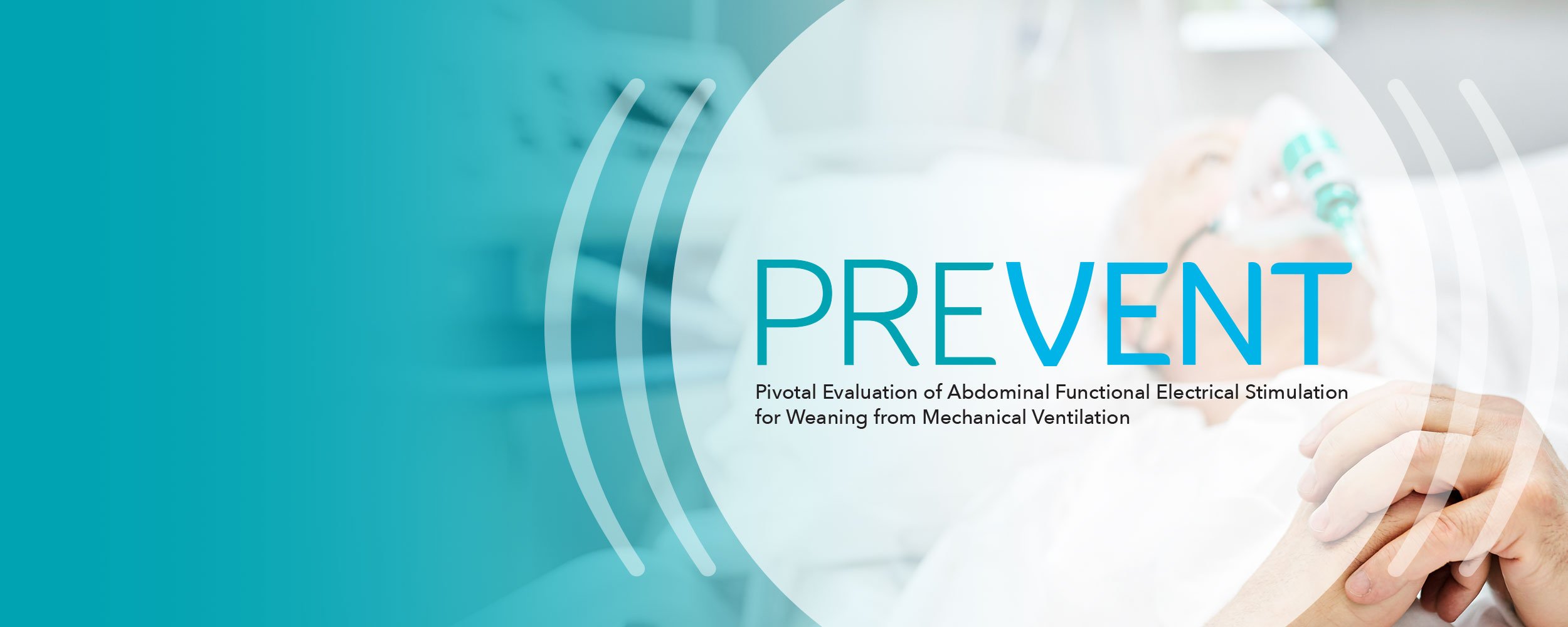
Evaluating a way to increase expiratory muscle strength to PREVENT additional days of ventilator support
The PREVENT study is evaluating the efficacy of the VentFree® Respiratory Muscle Stimulator to assist critically ill patients in coming off of a ventilator.
Pivotal Evaluation of Abdominal Functional Electrical Stimulation for Weaning from Mechanical Ventilation (PREVENT)
Study Objectives
What are the objectives of the PREVENT study?
The primary objective of the trial is to determine whether abdominal functional electrical stimulation delivered with the VentFree Respiratory Muscle Stimulator reduces the duration of invasive mechanical ventilation in critically ill adult patients compared to a sham control.
The secondary objectives are to determine whether abdominal FES increases the strength of the respiratory muscles, improves quality of life after discharge and reduces reintubations, hospital acquired infections, hospital and ICU length of stay and 90-day readmissions.
Study Overview
In the PREVENT study, the VentFree device will be applied for 30 minutes, twice per day for a minimum of five days per week until ICU discharge or 28 days whichever occurs first.
This study is for critically ill, adult patients receiving invasive mechanical ventilation in an ICU setting, who are expected to be difficult to wean.
Eligible patients include:
Receiving invasive mechanical ventilation for ≥ 24 hours but ≤ 72 hours at the time of enrollment
Not expected to be disconnected from mechanical ventilation within 24 hours after enrollment.
Prior Clinical Results
Expiratory Function
• 155% greater peak expiratory flow at extubation (P = 0.06)
• 36% greater maximum expiratory pressure at extubation (P = 0.28)
Clinical Outcomes
• Reduced ventilator duration (P = 0.07, median 2 day reduction in survivors)
• Reduced ICU length of stay (P = 0.03, median 3.5 day reduction in survivors)
Safety
• No device related adverse events requiring medical intervention
What is the VentFree® Respiratory Muscle Stimulator?
VentFree is a medical device used for the treatment of adult patients on invasive mechanical ventilation at the time of treatment initiation to increase cough and expiratory muscle strength and to reduce the number of days of ventilator support.
The VentFree Respiratory Muscle Stimulator uses non-invasive abdominal functional electrical stimulation to contract the abdominal wall muscles in synchrony with exhalation during mechanical ventilation and post-extubation.
Improve expiratory
muscle function
Non-invasive & safe
Reduces ventilator days
The VentFree device being used in the PREVENT study is for INVESTIGATIONAL USE ONLY
Consequences of Mechanical Ventilation
Hospital mortality is almost double in those patients who take more than 7 days to wean from ventilator support when compared to patients who require less.
Patients Lives
Prolonged periods in the ICU result in reduced functional status and increased mortality up to one year after discharge.
Quality of Life
Economic Cost
Each incremental day of mechanical ventilation in the ICU is associated with a cost of $1,500.
References
Patient Lives - Peñuelas, O. et al. Am. J. Respir. Crit. Care Med. 184, 430–437 (2011)
Quality of Life - Cox, C. E. et al. Crit Care 11, R9 (2007)
Economic Cost - Dasta, J. F. et al. Critical Care Medicine 33, 1266-1271 (2005)
Study Locations
Working with top institutions across the globe
Funding
The U.S. Army Medical Research Acquisition Activity, 820 Chandler Street, Fort Detrick MD 21702-5014 is the awarding and administering acquisition office.
This work was supported by The Assistant Secretary of Defense for Health Affairs endorsed by the Department of Defense, in the amount of $6,480,942, through the Peer Reviewed Medical Research Program under Award Number W81XWH2211123. Opinions, interpretations, conclusions, and recommendations contained herein are those of the author(s) and are not necessarily endorsed by the Department of Defense.











